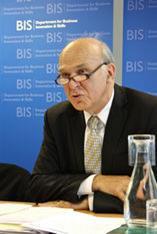
Concerns have been raised that the new Local Enterprise Partnerships (LEPs) fail to recognise food and farming as key sectors.
Business secretary Vince Cable outlined the government’s proposal to set up 24 LEPs, which would devolve economic development powers to English regions and cities.
The partnerships - which are intended to replace Regional Development Agencies - will draw from a £1.4 billion growth fund.
The NFU hopes they will take into account the “vital contribution” that agriculture can make to the economic recovery, particularly in rural areas, and said only a “handful” of the partnerships acknowledged farming.
The government said yesterday that it wants local business and civic leaders to work together.
NFU head of policy services Andrew Clark said: “Along with other business representatives, we asked for the partnerships to be business-driven. The good news is that it looks like that’s what we’ve got with the LEPs approved so far.
“However, reading through the initial proposals, it is apparent that farming and food are recognised as key sectors by only a handful of LEPs. Considering that farming generates some £7.1billion in gross value added terms to the UK economy, while agricultural raw materials literally feed the UK food and drink industry, it is disappointing that agri-food and rural issues are ignored in many proposals.
He added: “Agriculture can make a vital contribution to the economic recovery, especially in rural areas. Farming has multiple outputs beyond simply food: renewable energy, environmental services, rural employment and an accessible countryside. We expect that these LEPs will want to work with the tens of thousands of rural businesses involved in farming.
“The green light for the first batch of LEPs is just the start of the process and further clarity on the role and reach of partnerships is expected from government.”
Fears over a non-agricultural emphasis may well be founded. The department of communities and local government reports that in the west midlands, 80 per cent of its GDP comes from urban areas and 20 per cent from rural and there are fears that similar breakdowns in the north west and north east may lead to a focus on cities.
The Forum of Private Business welcomed the announcement on LEPs and is now calling for focus to be placed on other areas of economic need and help from the government for the proposed partnerships which need to re-bid.
Forum chief executive Phil Orford said: “We also believe that the £1.4bn growth fund should be focused on the areas of greatest need and innovative and transformational private sector bids for funding should be welcomed and encouraged.”
Orford warned against the possible abuse of tax increment financing by local councils.
Orford said: “We want to see continued fairness with local business taxation in order to foster business growth. With local authorities soon being able to borrow against future business rate increases, they may find it tempting to hike rates in order to borrow more, so this is certainly something which needs to be monitored and policed very closely.”